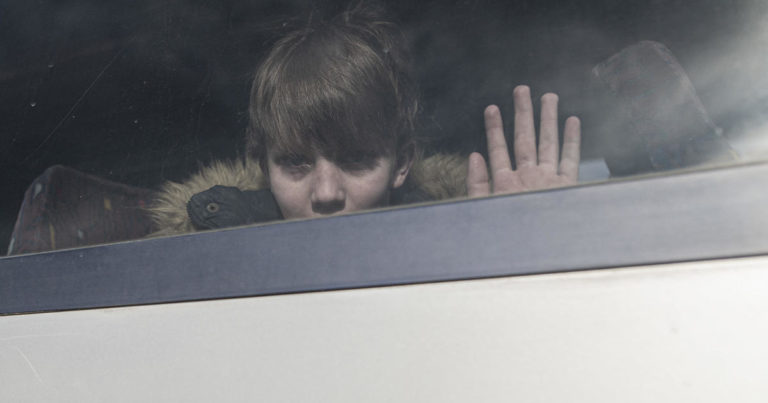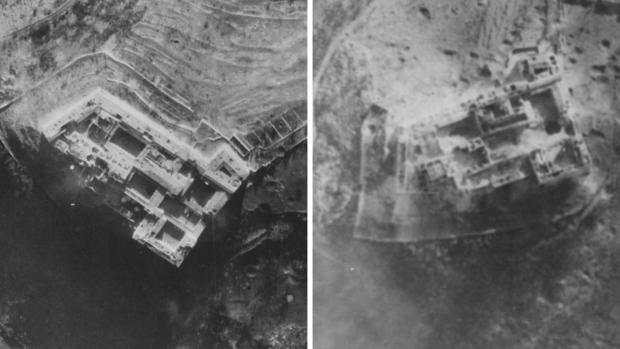
CBS News reporter Michael Roppolo explores the effects of armed conflicts on children in a personal essay after interviewing his grandparents about their childhoods during WWII.
U.N. human rights officials say dozens of children have been killed in Ukraine since the start of the war. Over one million more have fled as part of the fastest-growing refugee crisis in Europe since World War II, according to UNICEF.
“The number of children on the move is staggering, an indication of how desperate the situation for children and families in Ukraine has become,” said Afshan Khan, UNICEF regional director for Europe and Central Asia. “Children are leaving everything they know behind in search of safety. This is heart-breaking.”
As the war continues to rage on, it raises the question: How will children cope with the trauma of war and displacement — not only in the difficult days ahead, but throughout their lives? I began thinking of my grandparents, childhood survivors of World War II.
Courtesy of the Bauco family
The third eldest of six children, my grandfather, Giorgio Bauco, lived in the small Italian town of Ripi. Planes soon bombed his hometown, and by the end of WWII, there was nothing left in Italy, he often said.
He would often recount coming to America — a journey that involved two ships, a seven-year stay in Brazil, a plane and multiple engine troubles — but never about his childhood during the war.
My grandmother’s wartime childhood rarely came up in conversation. The oldest of five girls, Angela Federici was born in the small Italian town of Sant’Anatolia and immigrated to the United States as a teenager.
Then came the Russian invasion of Ukraine — nearly 80 years after the end of WWII. In what would be an emotional interview, I began asking them questions about their childhood.
When I asked them what stood out, they spoke of the bombings. Their little towns had been near Avezzano and Montecassino — bombed as part of the Allied effort to drive the Germans out of Italy and capture Rome.
“What stood out to me was the running, hearing the plane coming, the bombing, the running,” my grandmother recalled. “Running by myself. I was 6 years old.”
Forced to flee during the bombings, she, her mother and her sister ran to the mountains. There had been a small hut covered with leaves with other residents seeking shelter. She remembers her mother — my great-grandmother — pleading for safety for her daughters. But they could only take one for the night — my grandmother.
“It was rainy. It was cold,” she said as she began crying. “I went inside and then when I get out in the morning, I was full of lice — from my head to my toes.”
“I remember when the war was finished — after years of that, my father came home,” she said of my great-grandfather, who had been held prisoner by the Germans. “He came home with two fingers less because the bombs did that to him too.”
As I heard her say this, I had a flashback to seeing my great-grandfather when I was a toddler — with fingers missing on his right hand. This was the first time I’d known what happened.
My grandfather’s town was just 32 miles from the Abbey of Montecassino, thought by Allied forces to be a stronghold for the German army. It hadn’t been in 1944 — and more than 200 men, women and children seeking shelter inside the abbey died when it came under attack.
U.S. National Archives
At 6 years old, all he knew was running.
“Every night, the soldiers … used to tell us, ‘Get out from the house’ and ‘Go! Run faster,'” he said.
That experience stuck with him throughout his life.
“And the mind — it’s always in my mind,” he said. “I remember everything — what was going on at that time.”
Contrary to the popular saying, it’s wrong to assume children are resilient, says clinical psychologist Ramani Durvasula. Like adults, children can have a range of responses to a traumatic event.
“We have to be very careful,” she said in a Zoom call. “To sort of paint it with this wide brush that all children are resilient … that’s not the case at all.”
Such a blanket assumption, Durvasula warns, runs the risk of not only potentially under-treating possible mental health issues, but also under-responding to the child’s trauma. And any trauma a child experiences will impact their neural development.
“It’s going to be quite significant in children because their systems are still developing,” she said.
For any child — or adult, for that matter — how they respond to any traumatic event will differ based on several factors, including the severity of the trauma, the duration of the trauma and their proximity to the trauma.
“There can be fear,” said Durvasula. “There can be some lapses in memory. There can be a real sense of alertness and vigilance.”
For the children escaping the war in Ukraine, experts stress the importance of therapy sooner rather than later to help them cope with what they’ve experienced. Since children have less control over their worlds, the explanations they create are going to impact how they cope — not only around the time it happens, but even as they go into adulthood.
Children may feel that they’re to blame for whatever happened to them or that they did a bad thing. This may lead to the child thinking that they can “somehow try to be ‘better’ and that will make things better.”
“The key with children is to let them know that they are not responsible for traumas that befall them,” Durvasula added in an email.
“Children’s brains are very neuroplastic,” she said. “So there’s more opportunity, sort of, for growth and change through intervention like therapy.”
The war in Ukraine, and the disturbing stories and images dominating the news, could also bring up troubling memories for those who have lived through similar situations — a phenomenon called re-experiencing. Families with survivors may want to check on their loved ones.
“For people who may have survived that so many years ago as children, seeing this imagery as adults can be very activating,” Durvasula said. “That constant, ubiquitous presence of these wartime images can really, potentially be taking a toll.”
While interviewing my grandparents, I didn’t know what to expect. One thing was clear: The trauma was still there. Seeing my grandmother cry while she recalled her experience was heartbreaking.
“It’s very emotional to see these people today — to run,” she said of the war in Ukraine. “A lot of people help them. We were in this small town — nobody knew we were there.”
“I feel so bad for those people now,” she said. “Seems like I go through it again.”
As for my grandfather, the stoic façade slowly melted away.
“Whatever goes on today in Ukraine bring back my memory of what I went through myself,” he said softly — almost a whisper. “And it’s no good. War is no good for nothing — no, it’s not good.”
